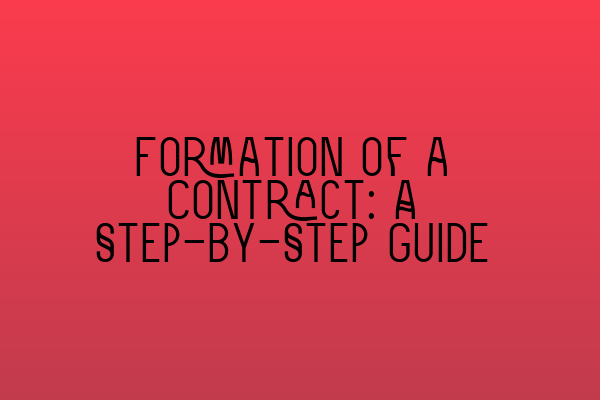Formation of a Contract: A Step-by-Step Guide
In contract law, the formation of a contract is a crucial process that involves several steps. Understanding these steps is essential for both solicitors and clients to ensure a legally binding agreement is formed. In this comprehensive guide, we will walk you through the step-by-step process of contract formation, from offer to acceptance.
Step 1: Offer
The first step in contract formation is the offer. An offer is a proposal by one party to enter into a contract with another party. It must be communicated clearly and sufficiently so that the other party can understand its terms and conditions. The offer can be made orally, in writing, or even by conduct.
Step 2: Acceptance
Once an offer has been made, the next step is acceptance. Acceptance is the unequivocal and unconditional agreement to the terms of the offer. It must be communicated to the offeror, and any conditions or modifications to the offer will be considered counteroffers. It’s crucial to note that acceptance must mirror the exact terms of the offer, also known as the “mirror image rule.”
Step 3: Consideration
Consideration is an essential element of contract formation. It is something of value that each party gives or promises to give in exchange for the other party’s promise. Consideration can be in the form of money, goods, services, or even an act. It must be sufficient, but not necessarily equitable or adequate in the eyes of the law.
Step 4: Intention to Create Legal Relations
For a contract to be legally binding, both parties must have the intention to create legal relations. This means that the parties intend to be legally bound by the terms of the contract. In some cases, it may be presumed that the parties have the intention to create legal relations, such as in commercial agreements. However, it’s essential to establish this intention explicitly to avoid any future disputes.
Step 5: Capacity
Capacity refers to the legal ability of a person to enter into a contract. In general, parties must have the mental capacity to understand the nature and consequences of the contract they are entering into. Minors, persons with mental impairments, and individuals under the influence of drugs or alcohol may lack the capacity to form a contract. It is crucial to ensure that all parties involved have the necessary capacity to avoid potentially void or voidable contracts.
Step 6: Legality
The subject matter of the contract must be legal for the contract to be enforceable. If the purpose or consideration of the contract involves illegal activities or goes against public policy, the contract may be void or unenforceable. It’s crucial to ensure that the contract complies with the laws of the relevant jurisdiction to avoid any legal issues.
Step 7: Formalities (Optional)
In some cases, certain contracts may require specific formalities to be valid. These formalities can include written agreements, signatures, or other legal requirements. It’s essential to check the specific laws and regulations governing the type of contract you are entering into to ensure compliance.
Step 8: Contractual Terms and Conditions
Contracts must clearly outline the rights and obligations of each party. These terms and conditions can include payment terms, delivery dates, performance obligations, and any limitations or exclusions of liability. Clear and unambiguous language should be used to avoid any ambiguity or misunderstandings.
Conclusion
Understanding the step-by-step process of contract formation is vital for both solicitors and clients. By following these guidelines and ensuring compliance with the law, you can help ensure that the contract is legally binding and enforceable. For further practice and preparation, you may also consider taking SQE 1 practice exam questions and SQE 1 practice mocks FLK1 FLK2. Additionally, if you’re interested in preparing for the SQE 2 exams or need assistance with SQE 1 preparation, you can explore SQE 2 preparation courses and SQE 1 preparation courses. Stay informed about SRA SQE exam dates to plan your preparation effectively.
Remember, contract formation is a complex legal process, and seeking professional advice from a solicitor is always recommended to ensure that your rights and interests are protected.
